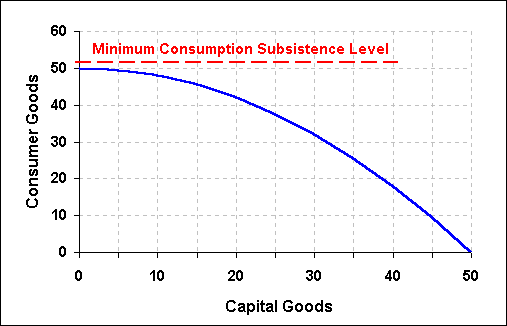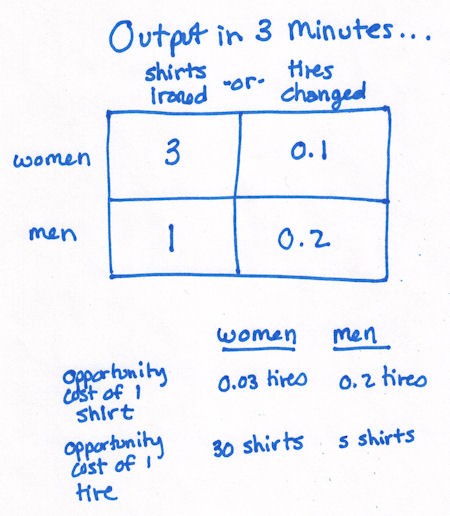Macroeconomics Cost Specialization and Trade
Post on: 16 Март, 2015 No Comment

Contents
1. Introduction
In Chapter 1 we introduced the economic principle of opportunity cost. Recall that the combination of limited resources and unlimited wants implies scarcity. Because goods and services are produced from scarce resources, goods and services are also scarce. Scarcity requires choice and implies costs. A scarce resource used to satisfy one need means there is some other need that cannot be satisfied. Opportunity cost represents the highest-valued alternative foregone in making any choice.
In this chapter we will use the principle of opportunity cost to justify the incentive individuals have to specialize in their labor. We will then extend the relationship between opportunity cost and the incentive to specialize to macroeconomic aggregates like nations. To do this we will develop our first economic model: the Production Possibilities Curve .
2. Specialization
How do we get the most out of our personal limited resource — labor? We specialize. We tend to concentrate our labor on one primary activity. Adam Smith was one of the first economists to explicitly identify the productive benefits of specialization, which he referred to as the division of labor.
The greatest improvement in the productive powers of labor..seem to have been the effects of the division of labor.
[A]n example. the trade of the pin-maker; a workman not educated to this business (which the division of labor has rendered a distinct trade), nor acquainted with the use of the machinery employed in it (to the invention of which the same division of labor has probably given occasion), could scarce. make one pin in a day, and certainly could not make twenty. But in the way in which this business is now carried on. one man draws out the wire, another straights it, a third cuts it. ; and the. business of making a pin is. divided into about 18 distinct operations. I have seen a small manufactory of this kind where 10 men only were employed. But though they were very poor, and therefore but indifferently accommodated with the necessary machinery, they could. make upwards of 48,000 pins in a day.
Adam Smith, An Inquiry into the Nature and Causes of the Wealth of Nations (1776)
But why is specialization efficient? There are several reasons. For example, through specialization we may acquire greater skill from repetition and we may avoid wasting time shifting from one task to another. Adam Smith also emphasized incentives for technological advancement. Smith suggested that if more of my time is spent on one activity, then I have an incentive to invest my resources to develop specialized tools or machines to aid me in that activity.
In the early 19th century, David Ricardo developed a different justification for specialization based on the concept of opportunity cost, which may vary across individuals because of differences in abilities. Ricardo’s theory is the subject of this chapter because it goes beyond explaining specialization by individuals to justify why countries (macroeconomies) also specialize and engage in trade.
If I specialize in teaching economics I would starve unless I was able to exchange the service I provide for food produced by someone else who specializes in farming.
When the division of labor has been. established, it is but a very small part of a man’s wants which the produce of his own labor can supply. He supplies the greater part of them by exchanging that surplus. of his own production, which is over and above his own consumption, for. the produce of other men’s labor. Every man thus lives by exchanging, or becomes in some measure a merchant.
Adam Smith, An Inquiry into the Nature and Causes of the Wealth of Nations (1776)

The fundamental method of exchange is barter . With barter no money is used. One good or service is exchanged directly for another. There are several problems with barter:
- requires a coincidence of wants — each individual engaged in barter must have a product that the other wants.
But when the division of labor first began to take place, this power of exchanging must. have been [difficult]. The butcher has more meat in his shop than he himself can consume, and the brewer and the baker would each of them be willing to purchase a part of it. But they have nothing to offer in exchange, except the different productions of their respective trades, and the butcher is already provided with all the bread and beer which he has immediate occasion for. No exchange can. be made between them.
Adam Smith, An Inquiry into the Nature and Causes of the Wealth of Nations (1776)
The introduction of money reduced the difficulty or costs of barter. For example, it is no longer necessary to have a coincidence if wants. Money is a common medium of exchange and represents general purchasing power . Money can be used to buy any goods and services offered for sale. Of course the role of money is much more extensive than this, but we will save that for a later chapter.
[T]o avoid the inconvenience of such situations, every prudent man. must have at all times by him, besides the peculiar produce of his own industry, a certain quantity of some one commodity. such as he imagined few people would be likely to refuse in exchange.
Many different commodities. were employed for this purpose. In the rude ages of society, cattle are said to have been the common instrument of commerce. The armour of Diomede, says Homer, cost only nine oxen; but that of Glaucus cost an hundred oxen. Salt. in Abyssinia; a species of shells in some parts of the coast of India.
In all countries, however, men seem at last. to give the preference. to metals. Metals can not only be kept with as little loss as any other commodity. but they can likewise, without any loss, be divided into any number of parts, as by fusion those parts can easily be reunited again.
Adam Smith, An Inquiry into the Nature and Causes of the Wealth of Nations (1776)














